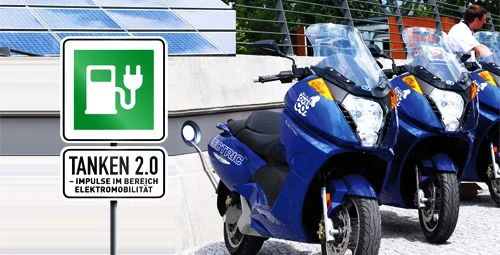Fuelling, version 2.0 – ideas in the field of electromobility
The era of crude oil as a fuel is coming to an end, and the demand is for alternatives with less impact on the environment and the climate. Accordingly, Adlershof companies are testing today their mobility concepts of tomorrow.
The greenery on the roof of Solon SE, a photovoltaics company, presents a view of the charging station “Yana”, twelve solar modules that inexorably follow the path of the sun. They are connected to a so called redox flow battery that can store a hundred kilowatt hours of electrical energy in an electrolytic solution, and fitted with an intelligent electrical connection system that records who has drawn how much electricity and transfers the billing data to an external server.
“Yana” is Younicos AG’s answer to the question of what a CO2 free charging infrastructure for electric vehicles could look like. Installed in 2007, this installation is already used by some employers to charge their electric scooters. But “Yana” has long seen the end of its test phase and is now being sold as a turnkey end to end system, e.g. to an Italian vintner for his electric tractor in his vineyards, or to hotels leasing electric bicycles. “This experience provides us with a valuable edge of knowledge for this future discipline”, confided CEO Alexander Voigt. And accordingly, Younicos has taken its place among the pioneers in this field. Yet politics too has now discovered the potential of electromobility. According to the federal government, there will be a million electric cars on Germany’s roads by 2020 – a feat whose success or failure will depend on how soon the right course can be set.
This trend will also be receiving support from WISTA-MANAGEMENT GMBH. “Owing to the restricted range of electric vehicles, we won’t be able to cover the whole spectrum of motor traffic. For commuter traffic, however, the electric car could become the future standard,” believes Gerald Bielfeldt, Authorised Signatory and Head of Controlling and Financing. The operating company of the technology park is therefore promoting a network of the local companies specifically for electromobility. “In addition, we are providing areas for the infrastructure,” he added. For instance for Flingster, the new car sharing services by the German railway operator Deutsche Bahn AG: in future, registered users will be able to use electric cars provided on the campus. A titillating foretaste both for the curious and for “e-car” sceptics will be provided at the Adlershof Summer Fest on 3 September. Gerald Bielfeldt, though, is keeping silent about the electric cars that will be provided for test drives, but an E-Smart from the power utility BTB will definitely be one of them.
Also the corporate group Freudenberg has integrated electromobility in its new plant in Adlershof as early as the construction phase. This automotive parts supplier is planning to site two “e-load” charging stations on the premises near Gross Berliner-Damm. Unlike the “Yana” system, the fuel pumps do not generate the electricity themselves, but are connected to the grid. What is drawn from the grid is then fed back by a company power plant operated by Freudenberg Service KG in Weinheim, Baden-Württemberg. “Based on combined heat and power generation, it is a particularly efficient system that also protects resources by utilising the waste heat from production for the generation of power,” explained Markus Rademacher, of Corporate Communications at Freudenberg.
Yana, e-load, Flingster – in Adlershof the setup of an e-mobile infrastructure has only just begun. Younicos AG is already forearmed for the time when electric cars will be rolling off the assembly line in a number of years: “Our car parks are connected with underground cables. Technically, it would be easy to connect here more charging stations that are then supplied from a central battery,” explained Alexander Voigt.
by Selina Byfield
